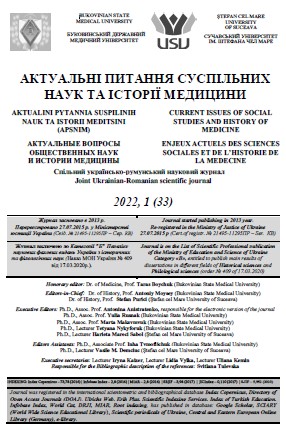ЛІНГВАЛІЗАЦІЯ НЕВЕРБАЛЬНИХ ЗАСОБІВ КОМУНІКАЦІЇ НА ПОЗНАЧЕННЯ ЕМОЦІЙНОГО СТАНУ МОВЦЯ (НА МАТЕРІАЛІ ХУДОЖНІХ ТЕКСТІВ СУЧАСНИХ УКРАЇНСЬКИХ ПИСЬМЕННИКІВ)
LINGUIZATION OF NON-VERBAL MEANS OF COMMUNICATION FOR INDICATION OF THE SPEAKER’S EMOTIONAL STATE (ON THE BASE OF LITERARY TEXTS OF MODERN UKRAINIAN WRITERS)
Author(s): Ivanna Struk, Anna-Diana VIKOVANIUKSubject(s): Ukrainian Literature, Theory of Literature
Published by: Видавництво ВДНЗ України « Буковинський державний медичний університет »
Keywords: non-verbal communication; linguization of nonverbal means; emotional state of the speaker; extralingual components; kinesic elements;
Summary/Abstract: The anthropocentric approach of modern linguistics is focused on the interest of researchers in the problems of verbal and speech expression of emotions, which can be realized through two semiotic areas – verbal, which represents the linguistic expression of emotions, and nonverbal, which is a physiological manifestation of emotions and which is an integral part of communicative act and characterizes not only the emotional state of the speaker, but also his attitude to the listener. The scientific novelty of the research is deepening knowledge of non-verbal components that express the emotional state of the speaker in the communication process; identifying the means of verbalization of non-verbal behavior of the characters in the literary text. The aim of our article is to analyze non-verbal means for identifying the emotional state of the speaker in the literary texts of modern Ukrainian writers (Irena Karpa, Serhiy Zhadan, Yuriy Andrukhovych, Yuriy Izdryk, Ivan Baidak, Andriy Lyubka, Natalia Morikvas). The relevance of scientific research is due to the need for a holistic study of non-verbal components for indication of the speaker’s emotional state in the literary text, analysis of their means of pronunciation, taking into account social and personal characteristics of the speaker in different communicative situations. The following methods and techniques of linguistic analysis are used in the article: system-functional analysis, component method, contextual-interpretive method, method of discursive analysis, method of stylistic analysis. Conclusions. The non-verbal components that were analyzed in the literary text for denotion the emotional state of the speaker accompany both positive and negative emotions of the heroes in the works of modern Ukrainian writers. We notice the prospect of a representative study in the further deepening of knowledge about the pragmatic features of non-verbal means for indication of the speaker’s emotional state taking into account age, gender, social and psychological factors in different communicative situations.
Journal: Актуальні питання суспільних наук та історії медицини
- Issue Year: 2022
- Issue No: 1
- Page Range: 100-103
- Page Count: 4
- Language: Ukrainian

